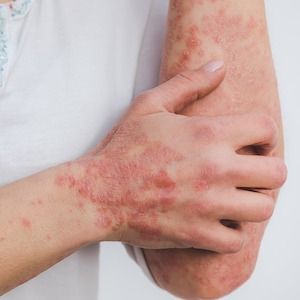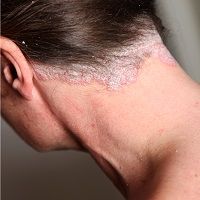Article
Study Finds Risankizumab Effective for Psoriasis Regardless of Body Mass Index
Author(s):
New data from a study in Italy found that, due to the lack of psoriasis drugs accounting for obesity, risankizumab was evaluated in patients with the inflammatory skin condition.
Eugenio Capalbo, MD
Credit: LinkedIn.com

Risankizumab treatment is efficacious in management of moderate-to-severe plaque psoriasis, according to a new letter to the editor, regardless of patients’ body mass index (BMI).1
The research was authored by Eugenio Capalbo, MD, from the Department of Medical, Surgical and Neurosciences at the University of Siena in Italy.
Capalbo and colleagues conducted the study due to the fact that, despite the existence of approved biologics for psoriasis, they saw a need for more effective drugs that may lead to higher long-term response rates for patients with obesity.
“Risankizumab is a humanized IgG1 monoclonal antibody that inhibits IL‐23 by binding to its p19 subunit,” Capalbo and colleagues wrote. “Although clinical trials and real-world studies have investigated its role in these patients, there are no comparative studies specifically evaluating the efficacy of risankizumab according to body mass index (BMI).”
Background and Findings
The investigators began their letter to the editor by noting that psoriasis is a disease whose onset and severity are influenced by several factors, including obesity.
They added that research has shown that obesity is an independent risk factor for psoriasis, and this is attributed to the secretion of inflammatory mediators by white adipose tissue.2 This leads to a low-grade inflammatory state that contributes to the pathogenesis of the chronic skin disorder.
The researchers wrote that interleukin (IL)-17 and 23 levels have been found to be substantially higher in obese individuals, underscoring a role as potential therapeutic markers. As risankizumab inhibits IL‐23, it was evaluated by the team according to patients’ BMI.
The research team used a multicenter, retrospective study in the region of Tuscany that included all of the patients who had been treated with subcutaneous risankizumab (150 mg) according to the dosing schedules.
In the study, the investigators gathered data from psoriasis patients who were at least 18 years old and had moderate-to-severe plaque psoriasis. The patients were each followed up for a minimum of 36 weeks.
The researchers also categorized the patients into 3 different groups based on their BMI: Group 1, which included patients with a normal weight (BMI of 18.5-24.9 kg/m2); Group 2, which included patients who were overweight (BMI of 25-30 kg/m2); and Group 3, which included patients who were obese (BMI >30.01 kg/m2).
The study evaluated the Psoriasis Area and Severity Index (PASI) ratings for 102 total patients, 38 of whom were women and 64 of whom were men. Among the participants, 28 were assigned to group 1, 54 to group 2, and 20 to group 3.
The team assessed PASI scores at baseline after 16 weeks and then after 36 weeks, with the goal of comparing the outcomes of the 3 different groups.
Group 1 was found by the investigators to have mean PASI scores of 13.41±6.15, 1.41±1.86, and 0.72±1.19 at baseline, 16 weeks, and 36 weeks, respectively. For the second group, mean PASI scores were 14.27±9.54, 1.57±1.77, and 0.64±0.98, respectively. The third group was found to have mean PASI scores of 18.24±12.89, 3.29±4.7, and 1.41±2.52, respectively.
The investigators also noted that no major adverse events were found. Overall, they note that all 3 groups had comparable findings as far as both efficacy and safety are concerned.
“All these data lead us to postulate that risankizumab represents an optimal molecule for the management of patients with moderate-to-severe psoriasis, regardless of BMI,” they wrote.
It should be noted that this study has some limitations, 1 of which is the small number of patients included in their research. Additionally, the numerical differences observed between the 3 groups were not substantial, so larger studies may be required to validate these findings over a longer time period.
References
- Dragotto M, et al. Real-life effectiveness of Risankizumab according to body mass index: results of an Italian multicenter retrospective study. J Eur Acad Dermatol Venereol. 2023 Apr 16. Doi: 10.1111/jdv.19117. Epub ahead of print. PMID: 37062048.
- Trovato E, Rubegni P, Prignano F. Place in Therapy of Anti-IL-17 and 23 in Psoriasis According to the Severity of Comorbidities: A Focus on Cardiovascular Disease and Metabolic Syndrome. Expert Opinion on Biological Therapy, 2022;22(12):1443-1448.





